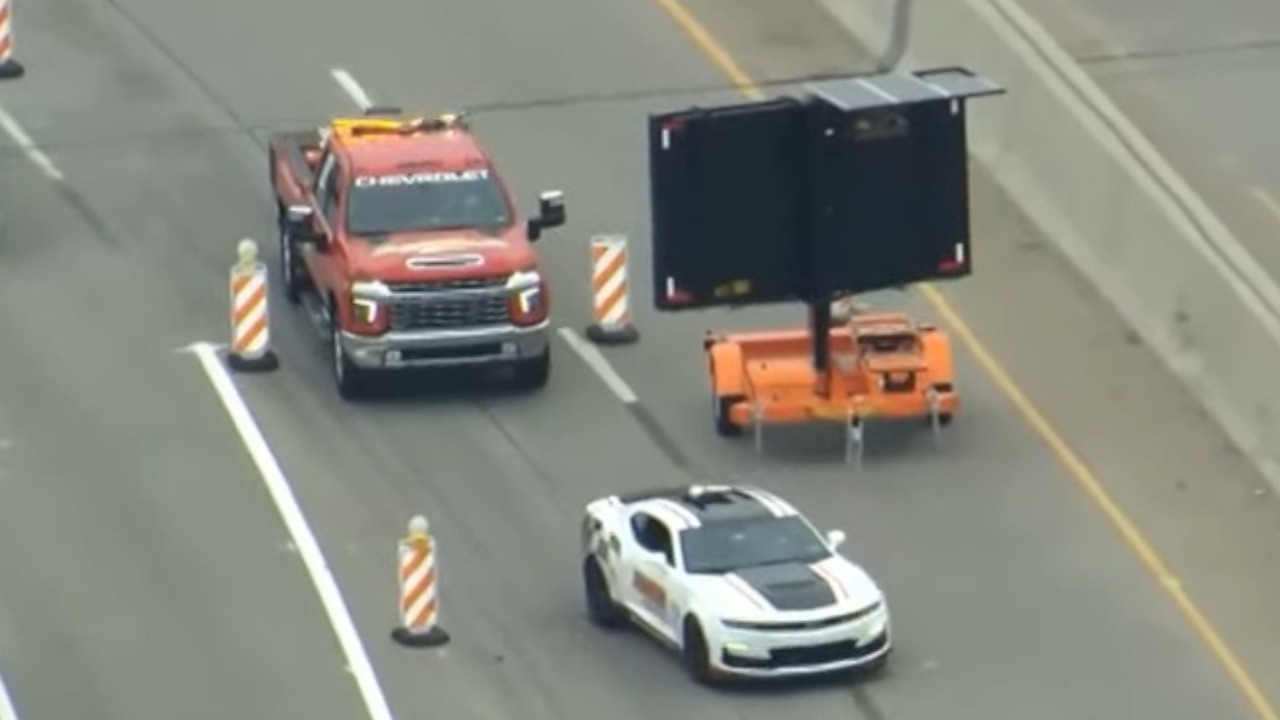Pennsylvania
NASCAR Jet Dryer Deployed to Help Rebuild I-95 in Pennsylvania

Since a devastating fire collapsed a section of I-95 in Pennsylvania earlier this month, the race has been on to get the highway repaired. A unique piece of motorsport equipment has now been enlisted in the effort to help the roadway reopen as soon as possible.
As covered by CBS News, a jet dryer from Pocono Raceway is on the I-95 job site to assist with repairs. Normally, the specially-outfitted Chevrolet Silverado is tasked with drying out the race track after rain delays in NASCAR. Authorities realized it could also be put to good use drying the new road surface amidst inclement weather in Pennsylvania.
The jet dryer will allow crews to paint lane lines on the temporary roadway more quickly during the wet conditions forecast for the coming days. News helicopters tailed the jet dryer on its way to the job site as it was escorted by Pennsylvania State Troopers.
Jet dryers came to NASCAR in 1976 thanks to Roger Penske. The legendary team owner had spotted similar equipment in use by a crew working on paving a trench at Michigan International Speedway. He quickly realized the hot jet exhaust would be perfect for drying a track after rain. With a few modifications to the design, jet dryers became a common sight on NASCAR ovals around the country.
Typically, I-95 sees 160,000 vehicles daily, prompting a rush effort to reopen the vital traffic corridor. A temporary roadway will open this weekend, just two weeks after the original structure collapsed. It will have three lanes in each direction.
The temporary roadway has been built by filling in the gap for the former underpass with a special lightweight glass foam aggregate. The material was chosen as it is lighter than rock, which would risk damaging an underground sewer line passing through the area.
As per the Pennsylvania Government live stream, construction on the temporary roadway is visibly progressing well. Once established, work will then proceed to fully rebuild the permanent bridge from the outside in to restore the damaged section to its full width.
Got a tip? Let the author know: lewin@thedrive.com

Pennsylvania
Pennsylvania Game Commission asking public to report any turkey flocks they see across state

The Pennsylvania Game Commission is asking for the public to report any turkey flocks they see across the state.
The information is being collected through March 15 to help the Game Commission trap them for ongoing projects.
You are asked to provide the date of the sighting, the location and the type of land (public, private or unknown) where the birds were seen. The Game Commission will then assess these sites to potentially trap the bird. Leg bands will be put on the male turkeys and then released back. In four Wildlife Management Units – WMUs 2D, 3D, 4D and 5C – female turkeys, hens, also will be leg banded and about 130 hens also will be outfitted with GPS transmitters, then be released back on site, to be monitored over time.
Trapping turkeys during winter is part of the Game Commission’s ongoing population monitoring, and provides information for large-scale turkey studies, as well.
Hunters who harvest these marked turkeys, or people who find one dead, are asked to report the band number and/or transmitter, either by calling toll-free or reporting it online.
“The data give us information on annual survival rates and annual spring harvest rates for our population model, and provides the person reporting the information on when and approximately where the turkey was banded,” said Mary Jo Casalena, the Game Commission’s turkey biologist. “In the four WMUs where hens are getting the GPS transmitters, we’re studying turkey population and movement dynamics, disease prevalence, and other aspects that may limit populations.”
The studies are being done in partnership with Penn State University and the University of Pennsylvania’s Wildlife Futures Program.
“The public was so helpful the last few years and some even helped with monitoring sites and trapping,” Casalena said. “We look forward to continuing this winter.”
This field study will conclude at the end of December 2025.
Download the FREE WPXI News app for breaking news alerts.
Follow Channel 11 News on Facebook and Twitter. | Watch WPXI NOW
Pennsylvania
DEP urges all Pennsylvanians to test their homes for radon this January

PITTSBURGH (KDKA) – There’s a new alert to all Pennsylvanians about radon testing still being crucial in homes, schools, and businesses to protect your health.
A state radon expert is shining a light on why people should take “National Radon Action Month” seriously, no matter where they live in the state.
We’re deep in the coldest days of the year; Homes are closed up and the heat is cranked up. It’s the best time to check your home for radon.
“Pennsylvania is probably the most radon-prone state in the country…We have results at least 25 times the EPA guideline of every county and some much more than others,” said Bob Lewis, the radon program manager for the Pennsylvania Department of Environmental Protection’s Bureau of Radiation Protection.
According to the American Lung Association, about 40 percent of Pennsylvania homes are believed to have radon levels, specifically above the EPA action level of 4 picocuries per liter (PCI/L).
Lewis said the naturally occurring radioactive gas can get into your home from the ground.
“It’s easily able to move from the soil and the rocks below the foundation, into the foundation,” he said.
You can’t smell, taste, see, or feel radon.
“Out of sight, out of mind, we can’t see it,” said Lewis.
He said breathing high levels of radon into your lungs can lead to serious health problems.
“So, we’re breathing this radioactive gas into our lungs and that’s where it’s deposited and that’s where it can do potential damage. These radioactive particles basically get lodged on the epithelial lining of your lung, the surface of the lung, mostly in the upper tracheobronchial areas. And over long-term exposure, they can increase one’s risk of getting lung cancer,” Lewis said.
According to the EPA, radon is responsible for an estimated 21,000 lung cancer deaths every year in the U.S., and radon is the second leading cause of lung cancer behind smoking.
Lewis said the first step to protect yourself and your family from the dangers is to buy an easy-to-use test kit at a hardware store or online. Then test your home and send the sample to a PA-certified lab. You can also hire a state-certified testing company.
“Get your test in the basement, and turn it back to the lab. You’ll get some test results after a week and a half or so,” he said.
If your test results are high, take action to reduce the levels in your home. You’ll need a certified radon mitigation contractor to install a radon reduction system.
“It’s an active system that uses some PVC pipe in the basement and it draws the air from underneath the basement floor to the outside and then dumps at the roof line. So basically, you have a vacuum cleaner underneath your house. Those systems work very well. They’re relatively low maintenance, about $1,000, generally speaking, for a system to be installed,” Lewis said.
The last step is to remember to monitor your mitigation system. According to the DEP, you should periodically check if the fan is running by looking at the U-tube manometer on the PVC piping of your system. The fluid levels on each side of the glass tube should be uneven.
Lewis said you should also do a radon test in the winter once every two years to make sure the mitigation system is still working properly.
While you have to pay for the system out of your own pocket, Lewis said taking radon dangers seriously is worth it in the end.
“It’s obviously a health benefit for you and your family. And it’s also a benefit when once you go then you go to sell the house too, at least if you’ve taken care of it,” he said.
You might not think about the dangers if you don’t own a house, but it’s recommended radon testing be done in rental homes, schools, and businesses too.
“We encourage, besides home, private homes, schools, and businesses to test as well. We’ve Been working with the Department of Education for quite a few years trying to get all the school districts to test,” Lewis said.
Call the DEP the Radon Hotline at 800-237-2366 for help with understanding test results and what action to take after getting back high results.
A list of state-certified radon contractors, labs, and testers is also available on DEP’s website.
The Allegheny County Health Department is providing more than 900 free radon test kits for residents. Pick up a test M-F between 8 AM and 4 PM at the Housing and Community Environment office (3190 Sassafras Way, Pittsburgh, PA 15201). One kit per household while supplies last so call ahead at 412-350-4046.
The American Lung Association is also offering free radon test kits. You can order them online.
Pennsylvania
Suspect in killing of woman in Pa. motel in custody in N.J., cops say

A suspect in the homicide of a woman in Bensalem, Pennsylvania is in custody at the Trenton Police Department, police said Wednesday afternoon.
The suspect and victim’s identities have not been made public.
The Bensalem, Pennsylvania police and the Buck County District Attorney’s Office said in a statement that officers found a woman dead at the Sleep Inn & Suites, on Street Road, early Wednesday. They did not detail the circumstances of her death.
-
/cdn.vox-cdn.com/uploads/chorus_asset/file/25822586/STK169_ZUCKERBERG_MAGA_STKS491_CVIRGINIA_A.jpg)
/cdn.vox-cdn.com/uploads/chorus_asset/file/25822586/STK169_ZUCKERBERG_MAGA_STKS491_CVIRGINIA_A.jpg) Technology1 week ago
Technology1 week agoMeta is highlighting a splintering global approach to online speech
-

 Science5 days ago
Science5 days agoMetro will offer free rides in L.A. through Sunday due to fires
-
/cdn.vox-cdn.com/uploads/chorus_asset/file/25821992/videoframe_720397.png)
/cdn.vox-cdn.com/uploads/chorus_asset/file/25821992/videoframe_720397.png) Technology1 week ago
Technology1 week agoLas Vegas police release ChatGPT logs from the suspect in the Cybertruck explosion
-

 Movie Reviews1 week ago
Movie Reviews1 week ago‘How to Make Millions Before Grandma Dies’ Review: Thai Oscar Entry Is a Disarmingly Sentimental Tear-Jerker
-

 Health1 week ago
Health1 week agoMichael J. Fox honored with Presidential Medal of Freedom for Parkinson’s research efforts
-

 Movie Reviews1 week ago
Movie Reviews1 week agoMovie Review: Millennials try to buy-in or opt-out of the “American Meltdown”
-

 News1 week ago
News1 week agoPhotos: Pacific Palisades Wildfire Engulfs Homes in an L.A. Neighborhood
-

 Business1 week ago
Business1 week agoMeta Drops Rules Protecting LGBTQ Community as Part of Content Moderation Overhaul




/cdn.vox-cdn.com/uploads/chorus_asset/file/25626687/DSC08433.jpg)











